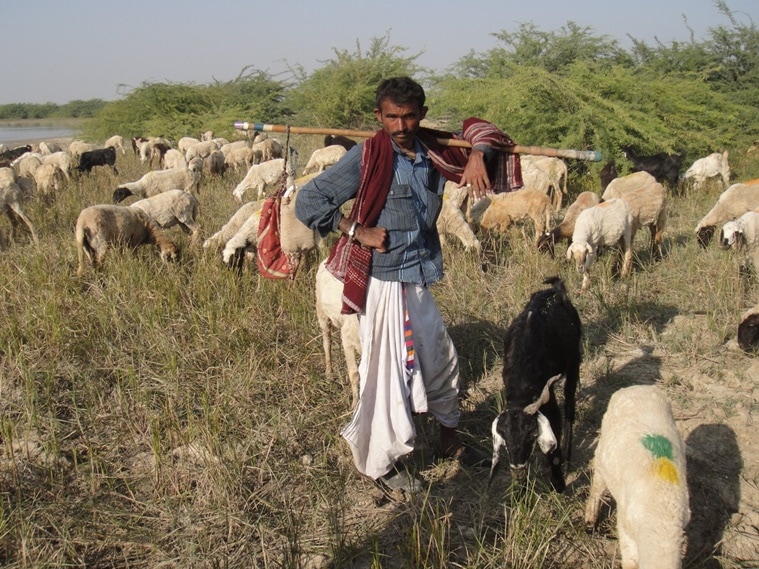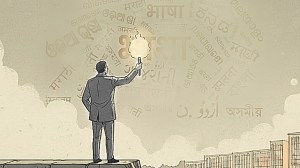Stay updated with the latest - Click here to follow us on Instagram
‘There is water and fodder now, don’t migrate’: PM Modi’s appeal to maldharis
Addressing a public meeting in Bhuj through a video conference from Delhi, Modi said the annual migration of maldharis does not behove “us” and Kutch.
 Due to the harsh geography and its remote location, the people of Kutch, called Kutchis, have been migrating to various parts of India and the world in search of a better life. (Express Photo)
Due to the harsh geography and its remote location, the people of Kutch, called Kutchis, have been migrating to various parts of India and the world in search of a better life. (Express Photo)Claiming that the times have changed and that water and fodder are now available in Kutch, Prime Minister Narendra Modi Friday appealed maldharis (traditional cattle-herders) to stop migrating from the semi-arid district as, he said, education of their children is getting affected due to their nomadic life.
Addressing a public meeting in Bhuj through a video conference from Delhi, Modi said the annual migration of maldharis does not behove “us” and Kutch. He appealed to the people of Kutch to stop the migration and expressed confidence that they will respond to his appeal this time too as they have been doing for several years now.
“There is one more work and I expect my brethren from Kutch to do it. My maldhari brothers live in Kutch for two-three months and for the remaining six to eight months, they will be on the roads with their herds, traveling miles on end. Does this behove us, Kutch?,” Modi asked while addressing the public meeting after inaugurating the K K Patel Super Specialty Hospital built by the Kutch Leuva Patel Samaj.
Spread over 45,674 sq km, Kutch is the second largest district of India after Ladakh and accounts for around 23 per cent of the total geographical area of Gujarat. The district, which shares the international border with Pakistan, is a semi-arid region having the Great Rann of Kutch and the little Rann of Kutch, two mudflat and marshland areas on its three sides and the Arabian Sea in the west.
 Kutch maldharis breed cattle, camels and smaller ruminants like goats and sheep. (Express Photo)
Kutch maldharis breed cattle, camels and smaller ruminants like goats and sheep. (Express Photo)
At around 20 lakh each, human and livestock populations are the same in this district as besides agriculture, cattle-herding remains the traditional occupation of a large section of residents of Kutch. However, one-in-three years remains a drought year in Kutch and the groundwater in many parts of the district is salty and therefore not suitable for irrigation and cultivation of fodder.
Due to the harsh geography and its remote location, the people of Kutch, called Kutchis, have been migrating to various parts of India and the world in search of a better life. “Why did your generation have to leave Kutch? Why did Kutchis have to fan across the world? What was that time like? For lack of water, life was difficult and the circumstances were such that it would make the lives of the children miserable. Therefore, Kutchis explored the world, worked hard and earned their living. They never begged anyone for anything. They stood on their own feet and wherever they went, they worked for the welfare of the locals too. Someone would be running a school, others would be running a gaushala. Kutchis would always be doing something,” the PM said.
But he added that times have changed now and it is time to do something about maldharis who lead a nomadic life. “Now that we are doing so much work, I request you, especially the maldharis, that it was okay in old times to migrate with your herds. But now, there is water available in Kutch…Let’s meet maldharis and explain to them, (appeal to them) to stop migrating with their herds and instead settle down here. You won’t face any trouble and send your children to school. As they migrate, their children are not going to school and this pains me. I seek your help on this front,” said the PM.
The district has emerged as an industrial cluster after the devastating earthquake in 2001. Since 2014, the eastern part of the district has started getting Narmada water through the Kutch Branch Canal of the Narmada Dam project and plans are to dig this canal down to Mandvi in the western part of the district.
The Sarhad Dairy, one of the district-level member unions of Gujarat Milk Marketing Federation Limited, the dairy federation which markets dairy products under the brand name Amul, has more than 400 village-level cooperative societies through which it procures more than four lakh litre of milk per day these days. Modi said that Kutch now cultivates jeera (cumin seed) and also produces and exports kesar mangoes, dates and kamalam (dragon fruits). The state government has also put the district on the tourism map of the country by organising the Rann Utsav, the annual desert carnival in the famous White Desert. Last year, UNESCO had declared the Dholavira Harappan site as a world heritage site.
“Just what is not there in Kutch now! Despite all this, if my maldhari brothers have to migrate, it is not good. There is fodder available there and even a dairy has been established. Therefore, you have now entered a period where you have only to make gains,” Modi said.
Kutch maldharis breed cattle, camels and smaller ruminants like goats and sheep. They are concentrated mainly in the eastern Kutch area known as the Vagad as well as in western Kutch which includes Banni, Asia’s largest grassland. They migrate within the district as well as go south up till Bharuch and the Maharashtra border in search of fodder and water.
Modi also asked people of Kutch to dig 75 large lakes in the district to mark the ‘Azadi Ka Amrit Mahotsav’, the ongoing platinum jubilee celebrations of the country’s Independence. “During the Azadi ka Amrit Mahotsav, we have suggested that 75 ponds be dug in every district. “Usually, it rains enough only once in three years to fill the dams. Sometimes, it even takes five years for such rainfall. I know there are children who would have not seen rainfall till they turn four-year-old. It is my request to you to dig 75 big lakes which will be historical in their own rights. Kutchis are spread across India — you run businesses in Mumbai, Kerala, Assam etc. There’s no place where your presence is not there. Kutchis have settled at least in half of the districts of India,” said Modi.







